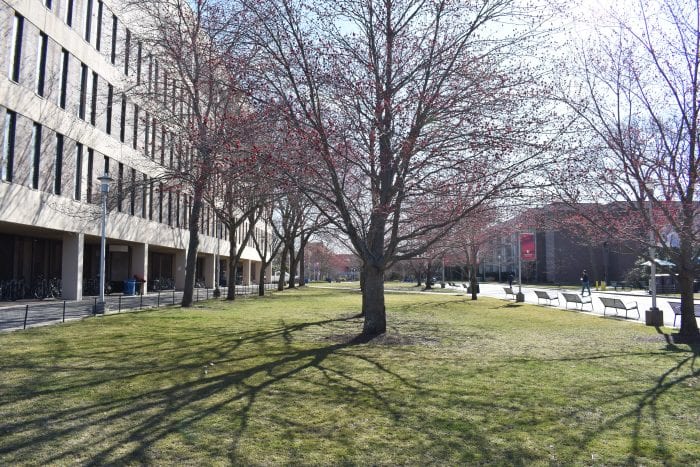Stony Brook Emergency Fund Bridges Financial Need

Like so many other plans this year, the goal for Stony Brook University’s Student Emergency Support Fund has changed.

The fund, which SBU’s Dean of Students Richard Gatteau launched in January, was originally planned as an endowed source of funds that would help students in need. Amid the ongoing financial dislocation caused by the pandemic, the fund has now provided everything from money for car repairs, which some students need to get to campus, to books, iPads, or even rent.
Through July, the emergency fund provided about $935,000 in support to 1,194 students, according to the dean of students.
“Once COVID hit, we realized in March and April, the need was overwhelming,” he said. The school put in a new strategy to raise more money to expand the focus to include basic life essentials, like paying the electric bill or groceries. The university “didn’t want this circumstance to force someone to drop out.”
For some students, the financial need, especially in the current economic environment amid job losses and higher unemployment, exceeds the resources that financial aid, grants and loans can offer.
“We’re working with students on the margin,” Gatteau said. The parents of many students don’t have the financial ability to support them, either.
Many of the students who initially received money from the emergency fund were remote learners who needed internet access or other remote support.
That included SBU junior Rijuta Mukim, who was working from her home in southern India when her computer broke down and her internet connection was unstable.
Taking classes and studying during the night and sleeping during the day to continue her education amid the time difference, Mukim was kicked off her Zoom calls for her classes within five minutes.
“I had a lot of trouble attending class,” Mukim said.
Without a fix for her computer and a better connection, Mukim, who is majoring in biology and psychology and hopes to attend medical school after she graduates, would have had to withdraw during the spring.
After she heard about the emergency fund on Reddit, she applied. Within a few hours, she received an email indicating that the school was trying to reach her by phone to make sure she was all right. She revealed her needs and received $1,000 within a week.
In the meantime, the support team explained her situation to her professors, who gave her extra time to complete her assignments.
Mukim had originally planned to work this summer at the Staller Center, but she was appreciative of the university and the donors who contributed to the fund for financial assistance, even as she worked from home several continents away.
“A thousand dollars might sound like a small amount but it helped me to ride through the spring and summer classes,” Mukim said. Having this kind of support “during a crisis is wonderful. It is satisfying to know there is a community helping you and looking out for you.”
Gatteau said other students also appreciated the calls soon after they made their requests.
Students “want an opportunity to tell their story, [to hear] a friendly voice on the other end of the call, to hear what’s going on,” he said. “Many students have faced challenging situations, with job losses and deaths related to COVID.”
A call from the emergency fund team can be as much about financial support as it is a counseling session with a student that helps them know how much the university cares about them.
As the fall semester started, the fund recently relaunched and has received between 130 and 150 applications for economic support.
The fund, which received a $75,000 donation from SBU President Maurie McInnis and is soliciting additional donations, is trying to rebuild after the earlier disbursements.
The call for donations has just gone out to community members, prior donors, alumni, parents, faculty and staff.
“We’ve done a full marketing campaign across all of the stakeholders who donated [previously] and then we try to reach out to new people,” Gatteau said.
The dean of students said the school is collecting donations of any size.
“Small amounts have made a big difference collectively,” he said.
The school estimates that $100 supports Wi-Fi access and other online learning costs; $200 contributes to lab fees and books; and $500 helps with groceries and rent.
The fund doesn’t currently allow donors to earmark their contributions for any specific purpose. Gatteau said the top priority with any student is for academic needs.
Despite the financial hardship caused by COVID and higher unemployment, officials said Stony Brook has not had many students drop out for financial reasons.
Amid concerns nationally about students ignoring social distancing or mask-wearing rules, Gatteau endorsed the way students have complied with rules.
“We’re very lucky,” he said. Students are motivated to prevent closures. “They want [the school] to stay open,”
Students whose financial need exceeds whatever the emergency fund can provide may be able to update their Free Application for Federal Student Aid — or FAFSA — forms, to see if they are eligible for additional financial assistance.
Meanwhile, students can apply to the Student Support Team at www.stonybrook.edu/commcms/studentaffairs/studentsupport. Students provide basic information and discuss their specific issues and challenges on a call.






